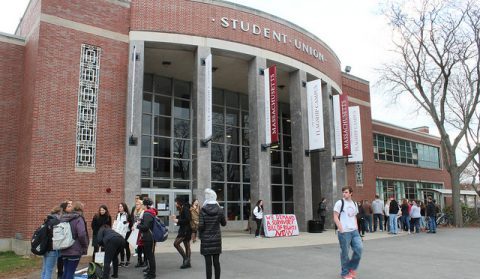The University of Massachusetts Native American Student Association held a Winter Social event welcoming students, alumni and community members in the Campus Center Auditorium on Saturday.
Around 60 people could be found in the auditorium at the social’s busiest moments talking, eating frybread tacos provided by UMass Catering or dancing to Urban Thunder and Iron River, the two drum groups playing at the event.
“We were looking to have an informal, welcoming tone for this event,” Charlotte Mills said, a senior anthropology major and the treasurer of NASA.
Mills said the Winter Social was decided upon to allow community members and former alumni to connect with UMass students and NASA before the annual UMass Powwow, which will be held on April 14 in the Curry Hicks Cage this year.
The Powwow, which attracted roughly 450 attendees last year, is a more boisterous event with a lot of energy, Mills said.
“Having your first interaction be a big powwow where there’s a lot of noise and music can be kind of intimidating,” she added. “We wanted something a little more low-key.”
Justin Beatty, the master of ceremonies for the social and a member of Urban Thunder, began the event by encouraging the people in the audience to dance to the intertribal songs.
He also thanked the indigenous peoples of the area.
“Had they not gone through what they had gone through, you would not be able to be in those spaces,” Beatty said.
The winter social also featured a stomp dance focused on combating opioid abuse in Massachusetts, led by storyteller Larry Spotted Crow Mann and musician Mixashawn Rozie. Spotted Crow Mann said they had been working with the Massachusetts Department of Health and members of the Wampanoag community such as artist Robert Peters.
He added that they are attempting to reach out to Native middle school students to prevent opioid abuse. He said they recently released a booklet entitled “Stories of Bones for Northeastern Children” for this purpose.
“Today one of the greatest concerns is the loss of our people to heroin and opioid addiction,” Spotted Crow Mann said.
Spotted Crow Mann said that stomp dances were originally used as a ritual designed for flattening the grass, but that as societal conditions have changed over time the significance of traditions have as well.
Rozie, who is Mohicanu, Mohawk and Cherokee, introduced the dance by playing a rendition of Curtis Mayfield’s “Freddie’s Dead” on the cana, an indigenous South American flute. When the stomp dance began, about 25 people participated, travelling in single file line throughout the room.
Rozie, a jazz musician who plays both traditional jazz and a style that incorporates indigenous forms, said he has written a book about the history of Native people in Connecticut and their impact on the modern world.
“I don’t look at history as something that happened in the past,” he said. “I try to connect it to the modern world. Otherwise what’s the point?”
Rozie said he comes from a musical family in Hartford, Connecticut and that his fourth great grandfather, who was Guinean, was the first African musician to play classical music in England.
Mills said the stomp dance was important due to its role in addressing an important issue effecting the Native American community.
“I thought it was a lot of fun, but it was also remembering this is one of the things we have to address in the big picture,” she said.
Later in the social, Mills, NASA President Angelina Larotonda and Vice President Brooke Yuen were honored by Joyce Vincent, a retired associate director of Cultural Enrichment and Student Services at UMass, for maintaining Native cultures on campus and organizing Native events such as the Winter Social.
“It was such a pleasure, it really felt like I had the support of the community,” Mills said. “Acknowledging the community has our backs meant a lot to us.”
Ray Cachimuel, a vendor at the event, said he normally comes to the Powwow to sell merchandise, and found out about the event through community members in the area. He was selling Inca ponchos, musical instruments and dreamcatchers.
“I have all kinds of instruments I make by myself,” he said. “The dreamcatchers are from Native people here. It’s all a mix of different places.”
Alex Hawk Looks Far travelled from Oxford, Massachusetts after learning about the event from a friend and attending the Powwow in April.
“Everyone’s polite and open,” he said. “The food’s good.”
Munkh-Erdene Baatarsuren, a senior studying computer science, said he learned about the event from the UMass application on his phone.
“Among the four events happening today I found this the most interesting,” he said. “I’m looking forward to the music.”
Stuart Foster can be reached at [email protected] or followed on Twitter @Stuart_C_Foster.



















